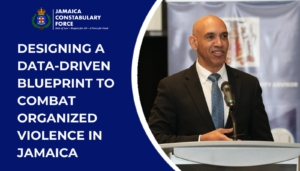
Jamaica has embarked on a revolutionary approach to combat organized violence, guided by the principles of data-driven analysis and community involvement.
Speaking at the second annual Security Seminar staged by the Office of the National Security Advisor (ONSA) Police Commissioner, Major General Antony Anderson shed light on the nation’s strategic endeavours and offered a blueprint for peace that is worthy of global attention.
The Power of Data in Unveiling the Truth
Central to Jamaica’s strategy is the commitment to a data-driven approach, as emphasized by the Commissioner. “Without data, you’re flailing around in the dark,” he remarked, highlighting the importance of empirical evidence over anecdotal narratives. This commitment to hard facts and figures is transforming the landscape of law enforcement and policy-making in Jamaica, providing a clear-eyed view of the challenges and progress in the fight against organized violence.
Statistics reveal a nuanced picture of violence in Jamaica, with illegal firearms implicated in upwards of 85% of violent crimes. This staggering figure underscores the urgency of addressing gun-related violence as a cornerstone of Jamaica’s security strategy. Moreover, the Commissioner’s analysis of homicide rates offers insight into the ecosystem of organized violence. With a substantial portion of homicides being gang-related, the data points to targeted interventions as a key to dismantling networks of violence.
Beyond the realm of statistics and legislation lies the core of Jamaica’s peace strategy: community involvement and people-centric initiatives. “Responses to organized violence must be community-involved and people-centric,” the Commissioner passionately stated, recognizing that the path to lasting peace weaves through the heart of the community.
This approach marks a significant shift towards long-term societal transformation, engaging citizens in the co-creation of safety and security. Through multi-sectoral citizen security plans and programs, Jamaica is nurturing a collaborative ecosystem where law enforcement and communities unite in a shared mission to rebuild and heal the fabric of society.
A Deep Dive into Homicide Analysis
The Commissioner’s presentation further delved into a detailed homicide analysis, revealing that a significant portion of such violence is gang-related, shedding light on the concept of an “ecosystem of organized violence.” This ecosystem not only increases the likelihood of violence among involved individuals but also affects the general perception of safety in society.
By dissecting the intricacies of this ecosystem, Jamaica’s law enforcement is better equipped to tailor interventions that address the root causes of violence, moving beyond surface-level solutions to foster a culture of peace and resilience.
Crafting a Narrative of Hope
The narrative emerging from Jamaica’s efforts is one of hope and resilience, a testament to the power of data-driven strategies and the transformative potential of community involvement. As the country continues to chart its course towards a safer, more peaceful future, the lessons gleaned from its journey offer invaluable insights for the global community.
In crafting this narrative, Jamaica not only challenges the misconceptions and fears surrounding violence but also illuminates a path forward for others grappling with similar challenges. Through the lens of the Police Commissioner’s address, Jamaica’s blueprint for peace stands as a beacon of innovation, collaboration, and unwavering commitment to the well-being of its citizens, deserving of recognition on the world stage.
As this story unfolds, it serves as a compelling call to action for nations and communities worldwide to embrace a holistic approach to security — one that is rooted in empirical evidence, enriched by community participation, and guided by a vision of long-term transformation. Jamaica’s journey, marked by challenges and triumphs, offers a powerful testament to the enduring strength of a society united in pursuit of peace.







